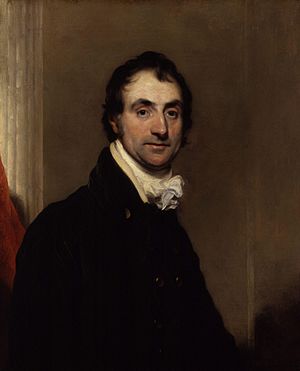Sharon Turner facts for kids
Quick facts for kids
Sharon Turner
|
|
|---|---|

Sharon Turner by Sir Martin Archer Shee.
|
|
| Born | 24 September 1768 |
| Died | 13 February 1847 (aged 78) Red Lion Square, London
|
| Nationality | British |
| Occupation | Historian |
| Known for | Anglo-Saxon history |
Sharon Turner (born September 24, 1768 – died February 13, 1847) was an important English historian. He is famous for his detailed books about the Anglo-Saxons. He helped people learn a lot about early English history.
Contents
Sharon Turner's Early Life
Sharon Turner was born in Pentonville, a part of London. He was the oldest son of William and Ann Turner, who came from Yorkshire. When he was fifteen, he left school to train as a lawyer in the Temple.
In 1795, he married Mary Watts. They had at least six children together. One of his sons, Sydney Turner, later became an inspector of schools. His daughter Mary married a well-known economist named William Ellis.
Becoming a Historian
Turner started his career as a solicitor, which is a type of lawyer. However, he soon left this job because he became very interested in history. He especially loved studying Icelandic and Anglo-Saxon literature.
He moved to Red Lion Square, which was close to the British Museum. He lived there for sixteen years. This location was perfect for his research. He spent a lot of time studying old books and documents.
Turner was friends with Isaac D'Israeli, a writer. Turner convinced D'Israeli to have his children baptized in the Church of England. This included Benjamin Disraeli, who later became a Prime Minister. Turner believed this would give them better opportunities in life.
Interestingly, Turner often wrote his notes on any paper he could find. He would use the edges of letters or the inside covers of magazines. His publisher even sent him clean paper, but he preferred to use whatever was handy!
History of the Anglo-Saxons
Turner's most famous work is his book, History of the Anglo-Saxons. This book was published in four parts between 1799 and 1805.
At that time, Britain was fighting wars against France. People were also discussing the idea of "Anglo-Saxon liberty" versus "Norman rule." Turner's book showed how the Anglo-Saxons had a good system of government. He wrote about their fair laws, wise kings, and a council called the witenagemot. He showed that they had strong principles of freedom.
To write his book, Turner did a lot of research. He studied many old documents at the British Museum. He also looked at the important collection of manuscripts from Sir Robert Cotton. Through this work, he learned to understand Old English.
His History had a big impact on how history was written for the next fifty years. The poet Robert Southey said that no other history book had ever given so much new information. However, some critics thought Turner was too romantic in his writing.
The famous author Sir Walter Scott said that Turner's work helped him write his novel Ivanhoe. In 1981, a historian named J. W. Burrow called Turner's book the "first modern full-length history of Saxon England." It was truly a groundbreaking work that many people admired.
Turner also wrote articles about English history for Rees's Cyclopædia, an encyclopedia of the time.
Other Historical Works
Sharon Turner continued to write about English history after his Anglo-Saxon book. He wrote several more books that covered later periods.
These included History of England During the Middle Ages, which covered the time from William the Conqueror to Henry VIII. He also wrote about the reigns of Henry VIII, Edward VI, Mary, and Elizabeth. In 1839, all his historical works were put together into a twelve-volume set called The History of England. This huge collection covered English history up to the year 1603.
Turner also wrote a book called Sacred History of the World. He even translated Beowulf, an ancient Old English poem. He also wrote a poem about Richard III.
Sharon Turner was buried in a brick vault at West Norwood Cemetery. His son, Sydney Turner, became a priest in the Church of England. His son-in-law, William Ellis, was an important educator and economist. Ellis even taught members of the British royal family.
 | Frances Mary Albrier |
 | Whitney Young |
 | Muhammad Ali |

